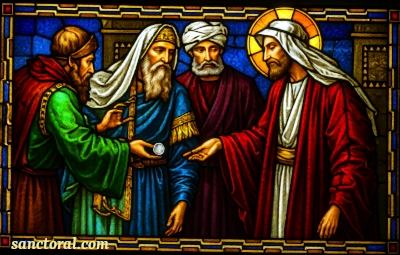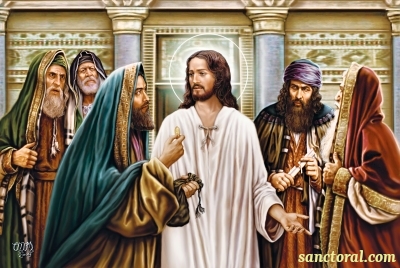To render to God what is His due and to reverence scrupulously His likeness in ourselves is the lesson in to-day’s Gospel. “Render to Caesar the things that are Caesar’s, and to God the things that are God’s.” This utterance of Christ’s, pronounced concerning Caesar’s effigy, has received considerable attention in Christian preaching which insists on all that we owe to God by reason of the incomparable gifts that He has showered upon us. “We,” says St Augustine, “are the coins of God stamped with His image, and God demands the return of His coins as Caesar did the return of his.” Bossuet says: “This image will one day pass again through the hands and before the eyes of Jesus Christ, and some day He will look at us and say: “Whose image and inscription is this?” And the very depth of our being will answer: “God’s.” It is for Him that we were made and we must bear His stamp upon us. It had to be restored in baptism of which it is the effect and character. But what has become of the divine features which we ought to bear? Christian soul, may God’s image be in your reason! But this you have drowned in drunkenness; you have sunk it in the love of pleasure; you have surrendered it to ambition; you have made it the slave of gold, which is a form of idolatry; you have sacrificed it to your appetites of which you have made a god; you have made of it an idol of vain glory, and instead of praising and blessing God day and night, it is itself constantly raised and admired. And the divine Redeemer will say: “Amen, Amen, I know you not: you are not my work, no longer do I see in you what I put there. You have chosen to form yourself in our own way: you are the work of pleasure and ambition: you are the work of the devil, whose works you have done, and whom, by taking him as your model, you have made your father. Go with him who knows you, and whose promptings you have followed; go to fire eternal which has been prepared for turn. O just Judge! And where shall I be found? Shall I acknowledge myself, when my Creator has disowned me?” It is in this sense that we must interpret this Sunday’s Gospel, one of the last of the ecclesiastical year and in which the Church reminds us of the end of the world. Thus the Epistle twice speaks of the coming of Christ as nigh at hand. St Paul prays that “He who hath begun a good work in you, will perfect it unto the day of Christ Jesus,” since the grace of final perseverance comes from Him alone. Again the Apostle asks that our “charity may more and more abound in knowledge and in all understanding”; that we “may approve the better things” that we “may be sincere and without offence unto the day of Christ” (Epistle). For in this dread moment: If the Lord “shall observe iniquities... who shall endure it?” (Introit.) But the Lord is the “helper and protector” of them that hope in Him (Alleluia), for if we cry to the Lord, He will hear us (Communion). We should take the opportunity of these reminders of the last judgment to renew our confidence in God and to prepare ourselves, by all the practices of a Christian life, to present ourselves before Him entirely transformed by the workings of His grace. (Saint Andrew Daily Missal with Vespers for Sundays and Feasts, by Dom Gaspar Lefebvre, O.S.B. of the Abbey of St. André, 1953) (Ps. 129:3-4) If Thou shalt observe iniquities, O Lord, Lord, who shall endure it? for with Thee is propitiation, O God of Israel. (Ps. 129:1-2) From the depths I have cried to Thee, O Lord: Lord, hear my voice. Gloria Patri. O God, our refuge and strength, who art the author of all godliness; hear, we pray Thee, the devout prayers of Thy Church, and grant that what we ask confidently we may obtain effectually. Through our Lord... Lesson of the Epistle of Saint Paul the Apostle to the Philippians (1:6-11) (Ps. 132:1-2) Behold how good and how pleasant it is for brethren to dwell together in unity. ℣. It is like the precious ointment on the head, than ran down upon the beard, the beard of Aaron. Alleluia, Alleluia. ℣. (Ps. 113:11) They that fear the Lord, let them hope in Him; He is their helper and protector. Alleluia. Sequel of the holy Gospel according to Matthew (22:15-21) (Saint Andrew Daily Missal with Vespers for Sundays and Feasts, by Dom Gaspar Lefebvre, O.S.B. of the Abbey of St. André, 1953)Twenty second Sunday after Pentecost - The tribute to Caesar

Table of Contents
Reflexions on the Liturgy of the Day
One of the most outstanding lessons which may be drawn from the books of Machabees, which almost every year are still being read at Matins at this time, is the reverence due to the things of God. What is generally called the rebellion of the Machabees was in reality a magnificent example of fidelity to God, to His law, and to the covenants and promises that He had made to His people. These were threatened with oblivion and it was to uphold them that the Machabees rebelled.
Liturgy of the Mass
Introit
Collect
Perseverance in well-doing is God’s gift. St Paul prays God to grant it to the Philippians who have always been closely united with him in his sufferings and apostolic labours and whom he loves as does Jesus Christ Himself. May their charity abound more and more that at the “day of Christ,” “filled with the fruit of justice,” they may give glory through Christ to God. The Apostle’s exhortation is spoken to-day to all Christians alike. Epistle
Brethren, we are confident in the Lord Jesus, that He who hath begun a good work in you, will perfect it unto the day of Christ Jesus. As it is meet for me to think this for you all, for that I have you in my heart; and that, in my bands and in the defence and confirmation of the Gospel, you are all partakers of my joy. For God is my witness, how I long after you all in the bowels of Jesus Christ. And this I pray, that you charity may more and more abound in knowledge and in all understanding; that you may approve the better things; that you may be sincere and without offense unto the day of Christ; filled with the fruit of justice, through Jesus Christ, unto the glory and praise of God.Gradual
“If,” says St. Hilary, “we rely on the goods which depend on Caesar, we must not complain of the obligation to render him his own. But we must also render to God, what belongs alone to Him, our body, soul and will.” (Matins) 
Gospel
At that time, the Pharisees went and consulted among themselves, how to ensnare Jesus in His speech. And they send to Him their disciples, with the Herodians, saying: Master, we know that Thou art a true speaker, and teachest the way of God in truth, neither carest Thou for any man, for Thou dost not regard the person of the men. Tell us therefore, what dost Thou think? It is lawful to give tribute to Caesar, or not? But Jesus knowing their wickedness, said: Why do you tempt Me, ye hypocrites? Show me the coin of the tribute. And they offered Him a penny. And Jesus saith to them: Whose image and superscription is this? They say to Him: Caesar’s. Then He saith to them: Render therefore to Caesar the things that are Caesar’s; and to God the things that are God’s. Credo